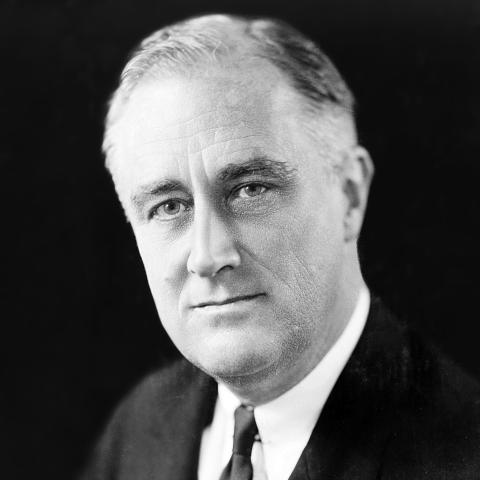“It was very kind of you to write me that fine letter”
Franklin D. Roosevelt to Bertrand Russell
April 18, 1939

In the spring of 1939, Russell and his wife, Peter, along with their son, Conrad, were living in the United States. Russell had just completed a one-year appointment at the University of Chicago and then re-located to California to get settled before beginning a planned three-year appointment at UCLA that fall. He almost immediately left on a lecture tour of the southern and eastern states to discuss the possibility of another world war. Russell was still clinging to the hope that peace might prevail even though Hitler had just snubbed his nose at the Munich Agreement of the previous September by invading Czechoslovakia.
On April 15, Russell was in Boston where he was thrilled to read in the news an account of the peace plea that President Roosevelt had issued to Hitler and Mussolini the previous evening. Russell immediately sent off an enthusiastic letter of thanks. He wrote:
My dear Mr. President,
At the risk of being held guilty of unpardonable impertinence, I cannot resist expressing to you my profound gratitude & admiration for your peace plea to Hitler & Mussolini. In so far as a humble professor can, I have worked for peace before the Great War, during it, & ever since; to this cause I have sacrificed all conflicting loyalties. Never before have I felt moved to express such feelings as now master me to any possessor of power.
Yours respectfully,
Bertrand Russell
Roosevelt replied three days later with the brief letter displayed here: ”It was very kind of you to write me that fine letter approving the course which I took.”
Russell’s relief was short lived. In September came the German invasion of Poland and the United Kingdom’s declaration of war, an event that gave Russell pause. He had never been a complete pacifist, believing that some wars were justified—from his perspective, the First World War had not been justified, but the Second, he painfully concluded, would be. His unequivocal declaration of support for the war was made on May 13, 1940, three days after the German invasion of Belgium, France, and the Netherlands, in the form of a letter to The New Statesman and Nation that was published in June. He wrote: “Ever since the war began I have felt that I could not go on being a pacifist; but I have hesitated to say so, because of the responsibility involved. If I were young enough to fight myself I should do so, but it is more difficult to urge others. Now, however, I feel that I ought to announce that I have changed my mind…”. He would spend the rest of the War doing what he could to support the Allies. (Of course, Roosevelt would also change his mind and would lead the US into the war after the December 1941 Japanese attack on Pearl Harbor).
Years later, Russell reflected on this period of his life in his Autobiography. “Although I clung to my pacifist convictions, I did so with increasing difficulty. When, in 1940, England was threatened with invasion, I realised that, throughout the First War, I had never seriously envisaged the possibility of utter defeat. I found this possibility unbearable, and at last consciously and definitely decided that I must support what was necessary for victory in the Second War, however difficult victory might be to achieve, and however painful in its consequences.”
Sources: (1) Bertrand Russell. The Autobiography of Bertrand Russell, 1914-1944 (Volume II). London: George Allen and Unwin Ltd., 1968. (2) Ronald W. Clark. The Life of Bertrand Russell. Jonathan Cape and Weidenfeld & Nicolson, 1975. (3) A copy of Russell’s letter to Roosevelt is held by the Bertrand Russell Archives (RA3 88); the original is at the Roosevelt Library in New York. (4) The New Statesman and Nation, n.s. 19 (8 June 1940): 719; a photocopy of the article is in the Russell Archives (C40.12).
that was published in June. THE WHITE HOUSE
WASHINGTON
April 18, 1939
My dear Mr. Russell:
It was very kind of you to write me that fine letter[1] approving the course which I took. I do appreciate it indeed.
Very sincerely yours,
Franklin D. Roosevelt
Bertrand Russell, Esq.,
Hotel Bellevue,
Boston,
Massachusetts.
[1] Russell wrote to Roosevelt on April 15. A copy of the letter is held by the Bertrand Russell Archives (RA3 88); the original is at the Roosevelt Library in New York.
Bertrand Russell Archives, Box 5.40, Document 054924. Public domain in Canada. Copy provided for personal and research use only. For any other use, the user assumes all risk.
